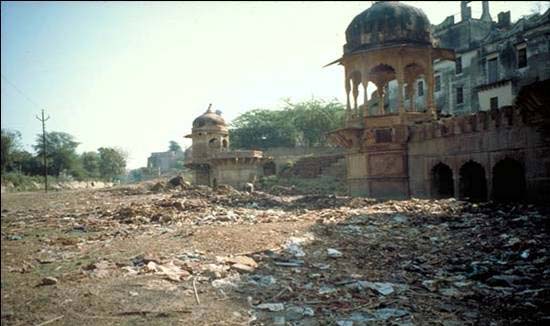Friends of Vrindavana Cleaning up Pilgrimage Town
By Jagannath Poddar | Oct 06, 2007

To revive the pilgrimage town’s cleanliness, Friends of Vrindavan began its ‘Clean Vrindavan’ program in 1997. Since then they’ve tidied up every corner of the town and inspired several other initiatives to serve its residents.. The locals are gradually participating as it provides an opportunity for them to have immediate sanitation services. Otherwise they’d depend on the ineffective municipal system.
A pilot project called Vrindavan Kuda Prabandhan Pariyojna (Vrindavan garbage management initiative) was initiated in 2005 as a pilot project for waste management. The UNDP GEF Small Grants Program, Sir Ratan Tata Trust and the GTZ ASEM have given financial support to help implement a privatized sanitation service that will involve the local people in its maintenance.
Vrindavan is divided into eight sanitation wards for the management of the sanitation services. Prominent temples such as Radha Damodar, Radha Raman, Radha Shyam Sundar, Shah ji temple, Meera Bai temple, Nidhi Van, Seva Kunj, Imli tala, Kheer Ghat and other places of religious importance are served by this initiative.
The streets and drains are cleaned twice a day. The segregated waste generated from the residential houses is collected every morning and later the waste is processed accordingly. Big community garbage bins are strategically placed in accessible locations. The huge amount of floral waste from the temples, the leftover vegetables from the market, and the remnants of the bhandaras (feasts) are collected separately and recycled into high quality compost fertilizer. Collecting the waste at the source helps to minimize garbage dumped in the Yamuna river.
In two years the program has become sustained by community support. This is largely due to having been managed by a steering committee consisting of many spiritual and community leaders. The temples, traders and residents also contribute funds for the cleaning.
The cleaning program is now replicated in the Raman Reti area. The Krishna Balaram temple (ISKCON), the shopkeepers, ashrams and the households of the area are contributing monthly. Garbage loading and transportation systems have been modernized by introducing garbage ramps so it can be directly loaded into the vehicle through the ramp and transported to the landfill site.
The project is providing income for 40 families. The compost made from the organic waste is sold to Delhi and other places and the revenue helps to pay their wages. Used plastic carry bags are recycled into baskets, bowls, dust bins etc. by local women. The sale of these products also ensures the program’s sustainability.
More support is needed from philanthropic individuals, agencies to scale the program to handle the densest part of this temple town. FoV has, however, encouraged other agencies to clean up and now it can be claimed that Vrindavan is far cleaner than the adjoining towns and is much more hygienic than a few years ago.
This unique example of community action could serve as a prototype for other projects such as water supply, healthcare, rain water harvesting, and conservation of the flora and fauna of Vrindanvan.














